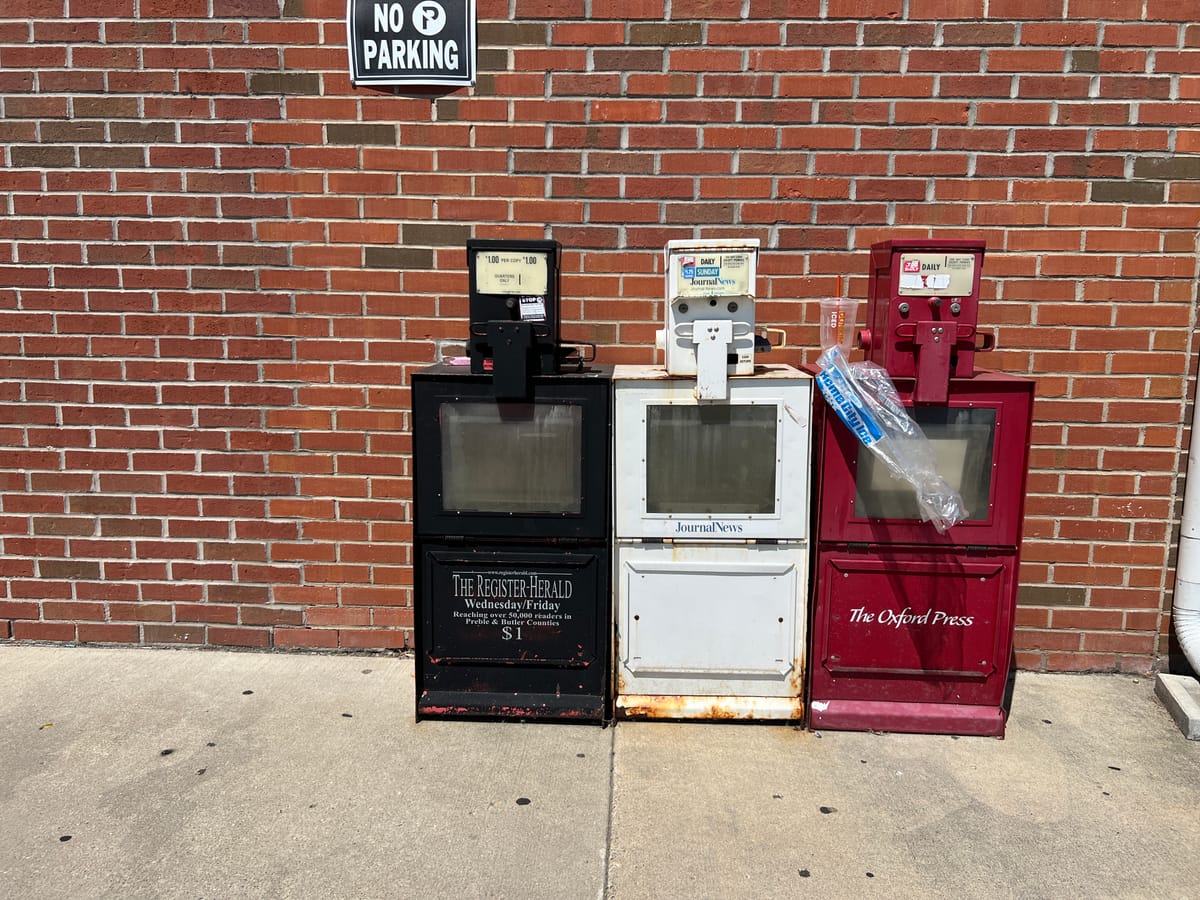Delivering the news: A community project

My brothers and I (Tom, Dick, and Harry … seriously) started our working lives delivering the afternoon Dayton Daily News in our modest suburban neighborhood in the 1960s. Our mother (the woman who named us) won a contest in 2019 as the oldest continuous reader of the Dayton Daily News. Starting in 1932, she and her sisters used the paper to learn and then teach English to their Croatian immigrant parents. Mom is now 98 now and still reads the paper daily in her Dayton nursing home.
The sad story of what is happening to local newspapers is now well known. Since the Internet undermined the newspaper business model, which relied heavily on classified advertising, newspapers have been folding – 3,000 have disappeared since 2005, one a week during Covid. More than 60 percent of journalists have left the profession. The Local News Initiative studies at Northwestern University now report that nearly half the counties in the U.S. have little or no access to local news.
The old Oxford Press served our community since 1936, telling our stories and documenting our public life. But after it was acquired by Cox, it steadily shrank from a vibrant weekly paper to a single page in the Sunday Journal-News, which serves Hamilton and Middletown. In January, Cox terminated the Press.
So why is this such a bad thing?
Well, when there are no local reporters covering local institutions and letting people know what’s happening and what's important, people drift to other places to get information – mainly to talk radio, evening cable programs, and social media. As we know, much of the information and chatter out there is undocumented, unreliable, and often wrong. Increasingly, we live in information cocoons, as predicted by the author and legal scholar Cass Sunstein 20 years ago: "You need not come across topics and views that you have not sought out. Without any difficulty, you are able to see exactly what you want to see, no more and no less."
Sunstein offered an early insight into the stunning partisanship that is fueled by talk radio, cable “news,” and Twitter (I refuse to call it X, which for me will remain a letter in the alphabet). When there are no longer shared sources, stories, and a foundation of facts, many of us take the path of least resistance, seeking out only views and ideas that affirm what we already believe – what researchers call “confirmation bias.” Simon and Garfunkel said it best in the 1960s in “The Boxer” – “A man hears what he wants to hear, and disregards the rest.”
With more than 85 percent of adults today owning smartphones, we indeed have easy access to all sorts of national news and entertaining stories, but also fervent misinformation. According to a 2019 Brookings Institution study, millions of Americans today see only national stories, and many of those “have a strong partisan bent” or “focus heavily on partisan conflict.” More alarming still, Brookings found the decline in local reporting has been accompanied by “a diminished capacity to hold elected officials and other local leaders accountable and a general disengagement from local politics.”
What is most discouraging about those fighting online partisan wars with perfect strangers (often from far flung reaches of the globe) is that we live locally. When most of our lives are spent with work, school, play, and family in our own communities, why expend enormous amounts of energy on social media arguing about national politics or global affairs, repurposing the last outrageous thing we saw on Facebook, and “disregarding the rest”? As Tolstoy famously noted: “Everyone thinks of changing the world, but no one thinks of changing himself.”
Our small band of founders and our new award-winning editor, Sean Scott, hope that returning a local newspaper to Oxford will help us refocus on our community and bring down the partisan heat down just a bit by providing a shared source of reliable information about our local institutions (schools, businesses, health services, community organizations, faith groups, police and courts). The common basis of verified facts that reporters provide is critical for identifying problems, needs, and priorities. The Oxford Free Press hopes to hold public officials accountable for responsible management of public resources; to apply the initiative and insights of professional journalism to spot and explain emerging issues; to provide a nonpartisan forum for the exchange of ideas and opinions; and to help bind the community together by sharing stories of each other's work, values and aspirations.
Our Constitution singles out only one business enterprise by name for protection in the Bill of Rights – “the press.” Since colonial America, newspapers have helped us make choices on everything from the food we eat to the representatives we elect. Local journalism has long been at the center of democracy, telling our stories and documenting a community’s life. To do this in Oxford and to sustain the Free Press over time, we need your help and support. We view the OFP as a community paper – a joint project that we all have a stake in. So please take the time to look at our donation information and help us make this community project work.
While I started my working life as a newspaper boy, I hope to spend the rest of my life helping deliver the weekly print edition of the Oxford Free Press to our community.
Richard Campbell is professor emeritus and founding chair of the Department of Media, Journalism & Film at Miami.




